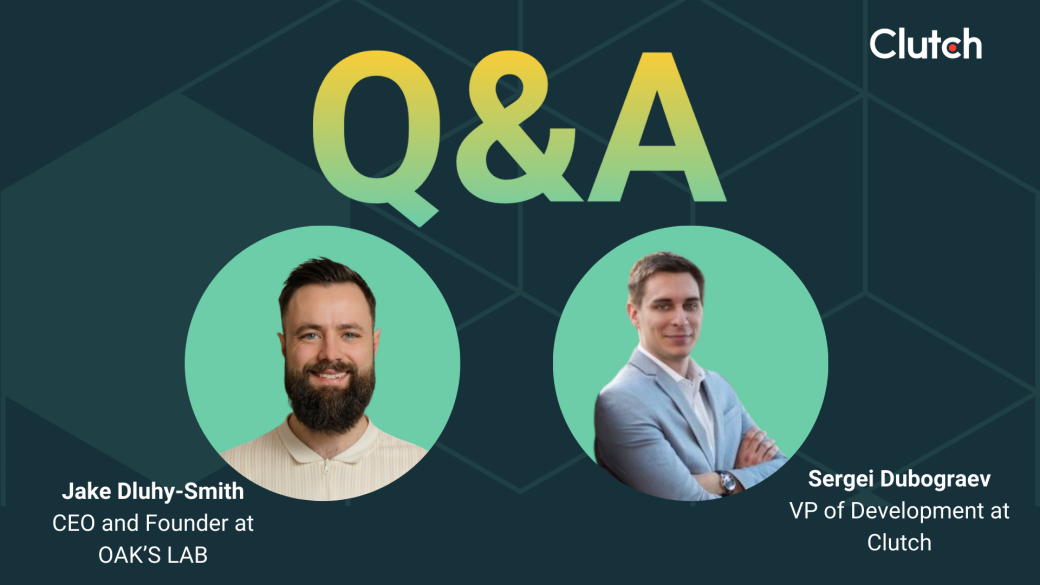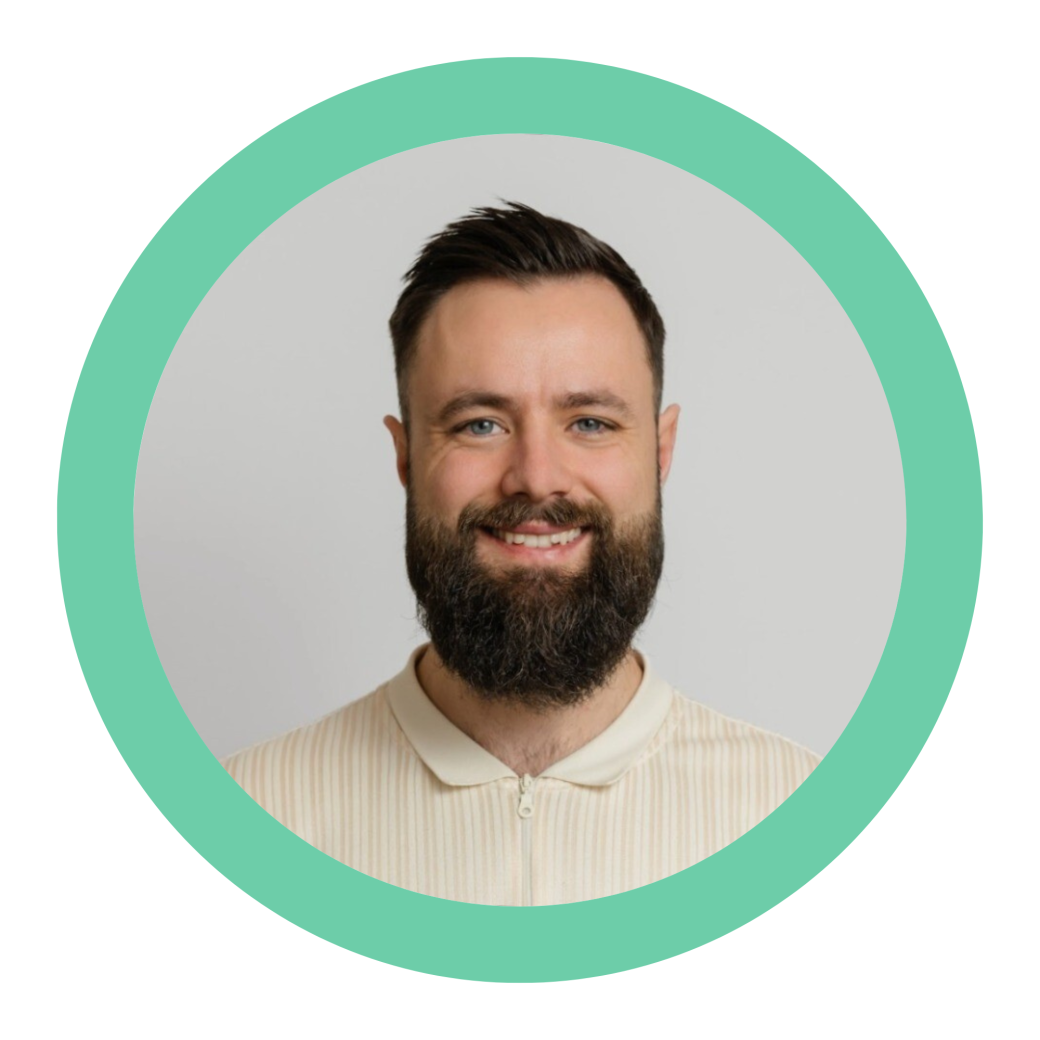

Updated February 18, 2026
This interview will cover Jake Dluhy-Smith's key methods for ensuring the outsourced partner you choose is really the best partner for you— including looking beyond portfolios and sales pitches, how to evaluate technical depth vs. breadth, when industry knowledge matters more than tech stack expertise, critical red-flags to avoid, questions that reveal project management capabilities, evaluation and alignment metrics, and more.

Looking for a Software Development agency?
Compare our list of top Software Development companies near you
In this video, you’ll learn:
Could you take us through your story of how you began your career in development and what encouraged you to build your own company?
Jake Dluhy-Smith [00:26-02:57]: I started building software products over 13 years ago and I'm half Czech, half American. I grew up in Silicon Valley and was always surrounded by game changing ideas that have shaped our world from a tech perspective. I was always inspired by the tech startup scene. I moved out to Prague, Czech Republic, eight years ago to start OAK’S LAB. My background is in product development - I was fortunate to be leading product efforts for a few venture backed startups. There I saw how even though you have this amazing grand vision, it's really important at the early stages to turn it into something much smaller to build a minimum viable product. I then moved onto the service side where I worked as the CEO for a digital development agency in Philadelphia, where we built remote product development teams for startups and corporations in the US. The American founders I work with often want to build everything at once, but that's not the best way to start. It's a real art to identify those first few features that will really move the needle to achieve your business outcomes. That's why I started this lab - to help founders get products right from the beginning to give them the highest chances of achieving product market fit.
When it comes to choosing the right product development partner, it can be a difficult process for tech leaders. Looking past the initial pitch phase, what are the key questions that reveal a partner's true technical capabilities versus just good salesmanship?
Jake Dluhy-Smith [02:58-05:44]: Yeah, it's really tricky because sales teams are out there to sell and can create captivating proposals. But when you kick off the collaboration, you often find it's quite different from the sales pitch. What really impressed me was a founder who recently reached out to us during the sales process. He said, 'I don't want to see a proposal in a PDF presentation. I just want you to walk me through the product development process. Pick one of your most recent projects. Walk me through how you do documentation. Open up the Figma file with the product designs, show me how you structure it. Open up the codebase and let me take a look under the hood. Then walk me through the demo environment and give me access so I can click around myself.' We thought that's the best way to vet a development company – to really look under the hood and go through the details on a real-life project to get a genuine view of how the company operates. That's probably what I would do as well if I was choosing my product development partner. Because as you said, the sales team can create an amazing deck, but when you're outsourcing your technology, you're buying much more than just a few slides.
In your opinion, how important is prior industry experience when choosing a product development partner? Are there times when it's less crucial?
Jake Dluhy-Smith [05:49-08:34]: I think it really depends on what industry the company is in and more importantly, what role they're looking for their product development partner to provide. If it's just staff augmentation on the delivery side to deliver features quickly and with high quality, then industry experience isn't that significant. But if they're looking for a partner to drive product strategy and discovery, having industry experience can really speed up the process and avoid a high learning curve. The person outsourcing should first determine what role they want the product development partner to provide, and then decide what experience they should have in the industry. If they want a development partner to drive product strategy and own product discovery - identifying features that move the needle for the business and that users will pay for - then in the sales process, it's important to look for a product development partner already providing product value, whether by improving the initial idea or suggesting alternative approaches. It's also crucial to find a product dev partner who tries to understand the business goals behind building the product. Once you uncover those goals, you can create the right product strategy, and the scope will likely evolve through market insights and progress toward those goals.
Every product always has problems to solve. Product development partners need to be adaptable. While technical skills are important, you need to understand how your partner problem solves. Do you have any specific scenarios from OAK’S LAB where problem solving made a difference?
Jake Dluhy-Smith [08:35-11:05]: Yeah, definitely. In the sales process, we outline the risks before the project starts - we actually have 3-4 slides in the proposal about potential risks. For example, with visionary founders, one common risk is having unrealistic expectations for the MVP. We plant that seed early, but we're not just negative - we also show how we'll help mitigate these risks. This lays the groundwork for challenging conversations later and helps manage expectations. Once the project starts, we have a process to routinely communicate about difficult topics. At kickoff, we ask our clients to be direct and honest with us. We have retros after every sprint for feedback, asking what we could do better or if there are unaddressed concerns. Creating this space throughout the project for open communication prevents mismanaged expectations from blowing up at the end.
That might be the secret sauce for our listeners - creating a space for open discussion and retrospectives. The goal should be building a partnership, not just a transactional relationship. How do you recommend handling disagreements when they arise?
Jake Dluhy-Smith [11:06-14:26]: At OAK’S LAB, we deploy dedicated teams with all roles needed to build a successful product - product manager, tech lead, design lead, engineers - that get inserted into the client's organization. Sometimes challenges arise at the team level where a stakeholder might have issues with a team member but isn't comfortable addressing it directly. We offer two communication channels: direct feedback during retros, and biweekly meetings between the stakeholder and our CEO for private discussions. This helps uncover concerns they might not share with the team. When solving issues, we always tie it back to business goals. If everyone - stakeholder, outsourcing firm, and team - is aligned on these goals, you can address problems by asking how they impact those goals and what needs to be done to stay on track.
Building on that - what do you look for in terms of culture when choosing a product development partner? Having the right culture seems essential for these communication strategies to work effectively.
Jake Dluhy-Smith [14:27-17:17]: Looking at companies from the US outsourcing offshore, there are three main markets: LatAm, Europe/Eastern Europe, and India. Each has a unique culture with pros and cons. Being half Czech, half American, I can assess the differences between US and Czech culture well. It's important for clients to first determine what matters to them - whether they want a results-first culture or a more innovative environment where deadlines might be less critical. When interviewing potential teams, ensure they share that mindset. Do research on these different regions' work cultures - for instance, in the Czech Republic, people are very direct, which can seem jarring to US founders but it's just cultural. Understanding these nuances can help avoid misinterpreting cultural differences as problems.
Having teams in Eastern Europe, I get it - I'm from there too. The directness can seem harsh to Americans, but it's actually better. You want to hear about problems right away, not weeks later.
Jake Dluhy-Smith [17:18-17:52]: And on the flipside, our Czech teams think American founders are too positive - it must be fake. But it's just the American dream mindset.
There are resources to understand cultural differences in different regions. They're not bad things, just different expectations you should be aware of when choosing a partner. And both sides need to adapt - it's not just one-way.
Jake Dluhy-Smith [17:53-18:43]: Exactly. From my career, I love combining the strong technical teams from Central and Eastern Europe with big American visionary founders. When you mix these cultures together, great things can happen.
What misconceptions about the partner selection process do tech leaders need to drop today to stand out in 2025 and avoid causing the most problems down the road?
Jake Dluhy-Smith [18:55-20:45]: Many companies we've worked with burned their hands outsourcing the first time because they went for the cheapest option. While price is important, if it's your main criteria, you'll usually have a bad outcome. The quality isn't there, and companies often end up rebuilding things, spending double the money. Companies who learn this the hard way don't make price their primary concern the second time. If you don't go for the cheapest option initially, you actually save money and get a higher quality product.
If you could only keep one app on your phone, what would it be?
Jake Dluhy-Smith [20:59-21:30]: I'm a huge sports fan. My most-used apps are Flash Score to track sports results, and Revolut to track my investments. I'm a big Arsenal fan.
What’s your go-to podcast?
Jake Dluhy-Smith [21:36-21:59]: I’ve loved the All-In Podcast. And Lex Friedman's great, especially his recent series with professors discussing different periods in history - I love history.
If you weren't in software, what career would you be in?
Jake Dluhy-Smith [22:00-22:31]: I grew up playing soccer at a semi-pro level. If I weren't in tech, I'd either be trying to play professionally or managing a football club.

Jake Dluhy-Smith is the Founder & CEO of OAK’S LAB, a startup tech partner built by Jake and his brother Theo, focused on creating custom web and mobile applications for business innovators. Jake has a background in product management, having led over 20 greenfield software product builds.
Interviewed by: Sergei Dubograev, VP of Development, Clutch


